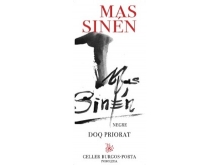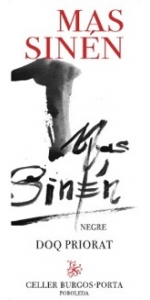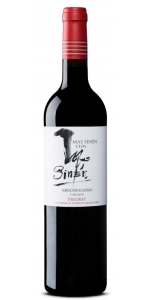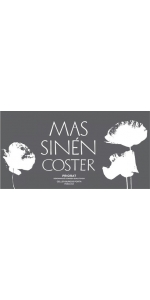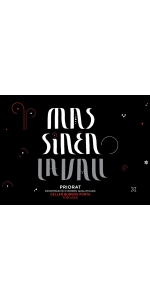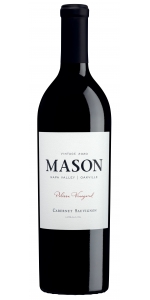Mas Sinen Negre Priorat 2016
Mas Sinen Negre Priorat is made from 38% Garnacha, 22% Cabernet Sauvignon, 23% Carinena, 16% Syrah
Aged in 90% French, 10% American oak barrels for 12 months.
Maceration for 21 days. ML in stainless steel tanks.
Clarification with white egg and soft filtration.
The wine shows great spice and leather components, some minerality and a lot of ripe red fruits aromas as well.
This wine is certified organic.
Review:
"Dark, bright-rimmed ruby. Highly perfumed, mineral- and smoke-accented red and dark fruit preserve, baking spice and floral pastille aromas, along with hints of licorice and black tea. Gently chewy and focused on the palate, offering juicy cherry, blackberry and spicecake flavors that deepen and turn spicier as the wine opens up. Finishes impressively long and sappy, with a lingering floral nuance, well-integrated tannins and a jolt of smoky minerality. Raised in new and used barrels, 90% French and 10% American.- Josh Raynolds"
- Antonio Galloni's Vinous (March 2021), 93 pts
Mas Sinen Clos Priorat is made from 38% Garnacha, 22% Cabernet Sauvignon, 23% Carinena, 16% Syrah.
Before the 2017 vintage, this wine was called Negre. It is the same vinification and level of excellence as the prior cuvee, but with a different name.
It's quite ripe, concentrated, powerful and oaky with black rather than red fruit and peat and graphite aromas. The palate is full-bodied with plenty of rough-hewn tannins and moderate acidity, and is in need of bottle age and/or powerful food. An XXL Priorat.
Mas Sinen Coster Reserve Priorat is made from 50% Grenache and 50% Carignan.
he Priorat DO was created in 1954. But it is only in the 1990 that the quality of the wines were able to compete internationally. It is now a DOCa (The highest qualification level for a wine region according to Spanish wine regulations, alongside Rioja DOCa). Total acreage for the entire appellation is 4,400 acres. Intense red cherry color with garnet reflections. Black fruit, compote fruits, hints of balsamic. The mouth is ripe and intense, fresh and powerful. Strong and flavorful.
50 year old vines planted on Llicorella soil (decomposed black and reddish Slate, mixed with Mica and Quartz). Light filtration.
Mas Sinen La Vall Priorat is made from 57% Garnacha, 24% Cabernet Sauvignon, 10% Cariñena (Carignan), 9% Syrah.
This wine has a highly intense, lively vermilion red color, complex yet direct aromas with predominant ripe black and red fruits, notes of minerals and forest herbs. Flavors are strong, full and layered with round, fresh and delicate tannins.
Pairs with meat, sausage, cheese.
All older vintage wines have been purchased from a single collectors cellar. Pictures can be requested before shipment.
Mason Cellars Pelissa Vineyard Cabernet Sauvignon is made from 100 percent Cabernet Sauvignon.
The 2020 Mason Oakville Cabernet Sauvignon is quintessentially Oakville from nose to finish. Attractive fresh blackberry, red current and chocolate with a hint of sweet oak boast out of the glass. This wine showcases graphite, velvety tannins and concentrated, beautifully balanced flavors with a bit of spice and white pepper. These bold flavors typical of Oakville Cabernet are rounded out with velvety tannins, a weighty mid-palate and a long, juicy finish.
Production Notes:
The fruit was delicately hand-picked in the early morning hours and brought into the winery for processing. The grapes were crushed, about 60% whole berry, and cold soaked for three days before being inoculated for primary and malo-lactic fermentation. Once dry, the wine was put down to barrel for 20 months in medium toast French oak, 25% of which was new.
Vineyard Notes:
Grapes for our 2020 Mason Cabernet Sauvignon are sourced exclusively from the Pelissa Vineyard in Oakville. This vineyard spans 60 acres and is planted to Old BV Clone 7 Cabernet Sauvignon as well as Zinfandel. This vineyard is named for Andrew and Babe Pelissa, who after their marriage on August 30, 1930, made their home at the site of this vineyard which, at the time, was a dairy. Oakville is the core of Napa Valley’s famed Cabernet Sauvignon production, and this site is no exception with the flawless blending of climate and soil to create a remarkable wine.
Review:
“This firmly structured, well-balanced wine has the feel of a classic Bordeaux blend. Just-ripe red and black fruits blend with subtle toast, cedar and mint on a moderately tannic, slightly tangy texture. The wine is tasty enough to decant and drink soon with grilled lamb chops or roast chicken. Best from 2026–2036.” – Jim Gordon
-Wine Enthusiast 94 Points
Mas Sinen Negre Priorat is made from 38% Garnacha, 22% Cabernet Sauvignon, 23% Carinena, 16% Syrah
Aged in 90% French, 10% American oak barrels for 12 months.
Maceration for 21 days. ML in stainless steel tanks.
Clarification with white egg and soft filtration.
The wine shows great spice and leather components, some minerality and a lot of ripe red fruits aromas as well.
This wine is certified organic.
Review:
"This is a super ripe and fleshy ball of rich dark berries and plums with a super rich, long and fluid texture. Such length and depth of blackberry fruit here. Drink now."
- James Suckling (July 2019), 91 pts
The Mas Sinen Estate
Mas Sinen is located in the village of Poboleda, in the province of Tarragona. The winery dates back to the 19th century and has been in the family for a few generations. Mas Sinen is a beautiful estate made of stone and surrounded by the family vineyards. Today, Salvador Burgos and his wife Conxita Porta, together with their two daughters, continue the family tradition using the most modern technologies to produce high quality wine from the Priorat Denomination of Origin.
The ancient Mountainous region of Priorat incorporates nine villages of wine production. They are:
- Gratallops
- Bellmunt del Priorat
- Torroja del Priorat
- Poboleda
- Porrera
- La Morera de Montsant
- Escaladei
- La Vilella Alta
- La Vilella Baixa
- El Llorar
- El Molar
The vineyards measure 1.662,55 hectares on size or 4,106.50 acres.
Priorat is about vines per hectare and not about hectares, because the yields are so low.
The name Priorat comes from the word Priory and refers to the 12th century Carthusian Priory established in the region
The old vines in the Priorat region are almost entirely Garnacha and Carignane.
Soil type: local schist called llicorella (decomposing soil type).
Prior to 1979 very few wineries were in production and the area was becoming depopulated. The interest and revolution in Priorat was created by five wineries whose names all began with the word Clos.
1. Clos Mogador - Rene Barber - the modern day pioneer of the region
2. Clos Martinet
3. Clos de L'OBAC
4. Clos Erasmus
5. Clos Dofi - famous winemaker, Rock star and self prom Alvaro Palacios
Today many new small producers with less than 3,000 cases in production are emerging from this area.
Prices for the wines are high and Priorat along with Rioja are the two regions entitled to the highest quality designation by D.O. law: Denominacion de Origen Calificada or DOQ
Today there are 73 wineries in Priorato with new ones coming all the time.
Wines are designed to age for 10-20 years. The styles vary, but Priorat reds are normally dark colored, muscular, tannic, ripe, rich in alcohol in nature Think Chateauneuf-du-Pape from Spain with a Spanish twist.
The Mas Sinen Vineyards
The vineyards measure 15 hectares total. They are planted in terraces, in the slopes of the "Mas Sinen" mountain and are situated 300-500 meters above sea level, cultivated under organic methods. The vines are 5 to 50 years old planted to local schist called llicorella (decomposing soil type) which is typical of the Priorat region.
- back
Familia Zuccardi 'Finca Piedra Infinita' Gravascal is made from 100 Malbec.
WINE DATA:
Grape Composition: 100% Malbec
Appellation: Finca Piedra Infinita, IG Paraje Altamira,Valle de Uco, Mendoze
Vinification: Manually selected grapes, filling of tanks by gravity. Fermentation with native yeasts in concrete vessels without epoxy. Aging in concrete vessels. The 2020 was a very particular vintage, characterized by limited yields and a high speed of maturity, which made it one of the fastest and most challenging on record.
In the search for the purest expression of the identity of Finca Piedra Infinita vineyard, we reached this small plot of 0.73 hectares. Located on its north-east side, it shows the typical facet of Paraje Altamira soil, with large gravels and granite stones covered with calcareous material at a depth of 50 cm.
Altitude: 3,609 feet above sea level
Soil Type: Short alluvial soil covered with calcareous materials
Alcohol: 14% Total Acidity: 5.6g/l
TASTING NOTES:
Color: Bright ruby color
Aroma: Dark berries, black olive tapenade, and iron
Flavor: Rich on the palate, with firm tanins
EnRoute Winery Brumaire Chardonnay is made from 100 percent Chardonnay.
From the inviting lemon peel and passion fruit perfume to the silky palate filled with notes of tropical guava, white peach blossom, and nectarine, the 2020 EnRoute Brumaire is at once opulent and elegant. Full and generous, with juicy acidity, cool mineral accents – think wet slate and crushed shell – and a lifted vanilla and toffee finish, this is a vintage with presence.

